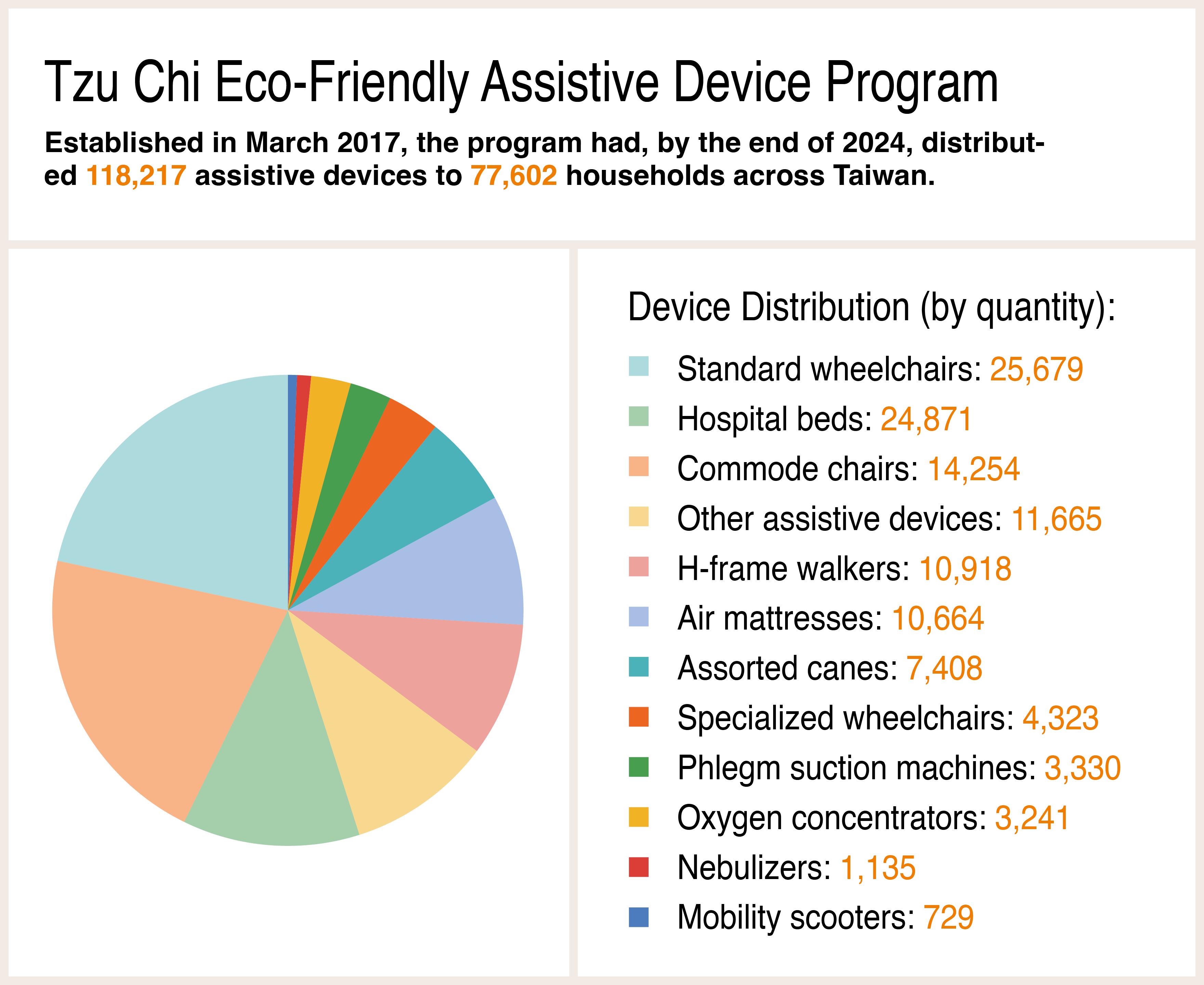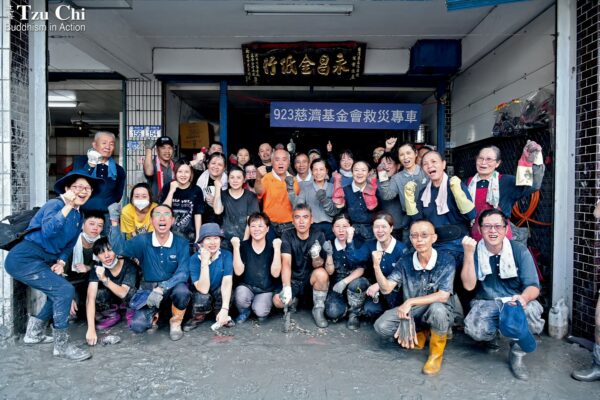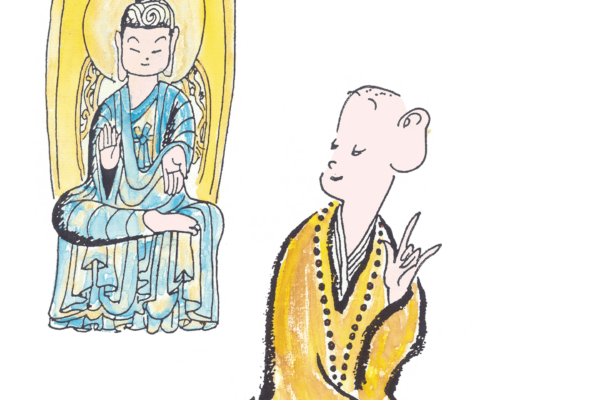By Shi Jin-xiu
Translated by Wu Hsiao-ting
Photos by Chen Jun-lang
With each assistive device they deliver, Tzu Chi volunteers offer not only relief but also a reminder that no one is alone.
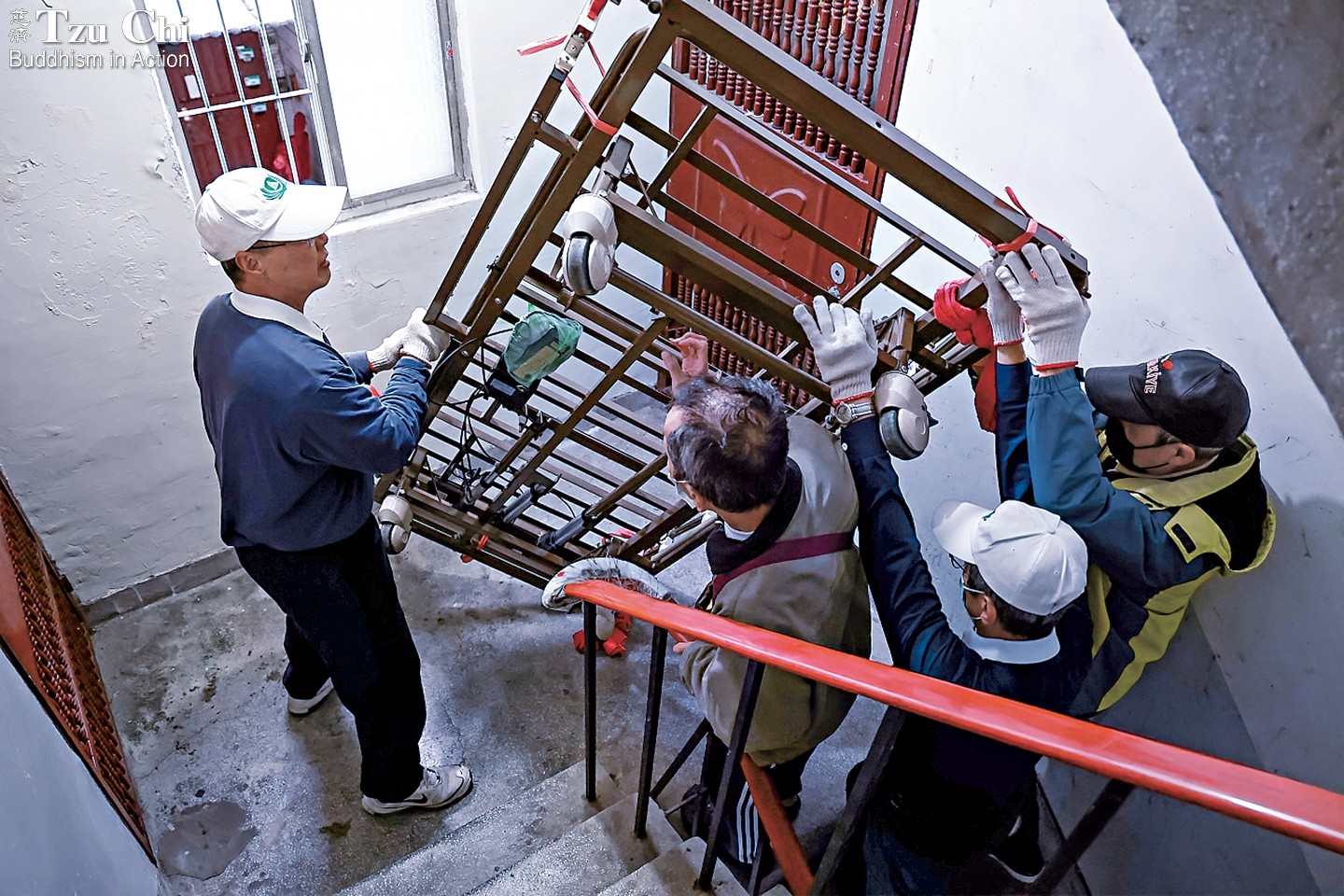
Volunteers carefully carry a heavy bed frame up the stairs of a walk-up apartment building, mindful to avoid injury.
On a weekend morning, a white truck prepared to set out from Tzu Chi’s Neihu campus in Taipei. It was loaded with electric hospital beds, wheelchairs, commode chairs, and other assistive devices for delivery to applicants’ homes. Before the truck departed, volunteer Jiang Li-qiang (姜禮強) carefully checked each item. “If we don’t take a thorough inventory, we might forget something and have to make another trip,” he explained. At the same time, other volunteers secured the equipment to prevent it from shifting during transit.
Nearby, Wu Dun-rong (吳敦榮), the contact person for the Neihu outlet of the Tzu Chi Eco-Friendly Assistive Device Program, was busy finalizing the next day’s delivery schedule with applicants. Several years earlier, Wu’s mother had suffered a fall due to high blood sugar, fracturing her hip and requiring a wheelchair. A wheelchair from the Tzu Chi Neihu Recycling Station had helped her move around more easily. Grateful for the support his family had received, Wu decided to pay it forward. He began volunteering for the assistive device program.
Volunteer Lai Zheng-qiao (賴正喬) had a similar experience. His mother had fallen in a nursing home and fractured her pelvis, making movement difficult. One day, while on duty at the Neihu campus, he learned from fellow volunteers about Tzu Chi’s assistive device program, which provided free equipment along with delivery and handling. After applying for devices and experiencing the program’s benefits firsthand, he came to appreciate its importance. When he learned that the program needed more delivery volunteers, he joined and has since often assisted with weekend deliveries. “The more I give, the more joy I gain and the deeper my sense of fulfillment,” he said with a smile.
Compared to Wu and Lai, Jiang is a veteran in this work. He began delivering assistive devices more than 20 years ago—long before the program was officially established in 2017. He had once run a meat floss factory, where his daily routine included transporting 70 to 80 freshly slaughtered pigs each morning for production. After joining Tzu Chi, he switched to a vegetarian food business and dedicated himself to recycling work. This gave him more opportunities than most to encounter used hospital beds and wheelchairs. At first, he dismantled them for recycling. But when he saw that many were still in good condition, he began delivering them to those who needed such equipment instead.
Since its founding in 2022, the Neihu outlet of Tzu Chi’s assistive device program has grown significantly. Applications increased from 83 in 2022 to 560 in 2024, while total deliveries and collections rose from 161 to 1,652 items—an average of 4.5 per day. As demand has increased, so have volunteers’ responsibilities. The cleaning and disinfection team works even on the coldest days to ensure each device is sanitized and as good as new before reaching an applicant’s home. The repair team stays busy in their workspace, quietly fixing broken equipment. The administrative and transport teams are just as dedicated, diligently attending to their respective duties.
Over a hundred items a day
There are now more than 130 Tzu Chi assistive device outlets across Taiwan, located in every county and city, including the offshore islands of Kinmen and Matsu. In 2024, volunteers nationwide delivered an average of 110 assistive devices per day. Their efforts not only extend the lifespan of secondhand equipment but also significantly benefit those in need. For example, air mattresses help bedridden patients reduce the risk of pressure sores, while high-back wheelchairs provide extra support and comfort for those with spinal issues. Volunteers use their hands-on experience and training to teach caregivers how to use the equipment safely.
Deliveries often present unexpected challenges, turning each trip into a journey of overcoming obstacles. Volunteers often have to navigate winding or narrow alleys and obstacles such as illegally parked cars or piles of clutter to ensure the equipment reaches applicants’ homes.
Some recipients live in congested areas where parking is difficult. In such cases, volunteers park farther away and carry the equipment on foot. Along the way, they often experience kindness from strangers. “When shop owners see us delivering assistive devices, they not only let us park temporarily but also keep an eye on our vehicle,” Wu shared with a smile.
Transporting the equipment, especially electric hospital beds, is physically demanding. Volunteers must be familiar with proper lifting techniques to prevent injuries. In older buildings without elevators, they carry the equipment up narrow staircases, working closely as a team to navigate tight turns. According to Lai, hospital beds vary in weight and size. To conserve energy, they prioritize delivering lighter beds to higher floors, while heavier beds are reserved for lower floors or buildings with elevators. “We bring a tool kit to disassemble beds when necessary, which makes transportation easier,” he added.
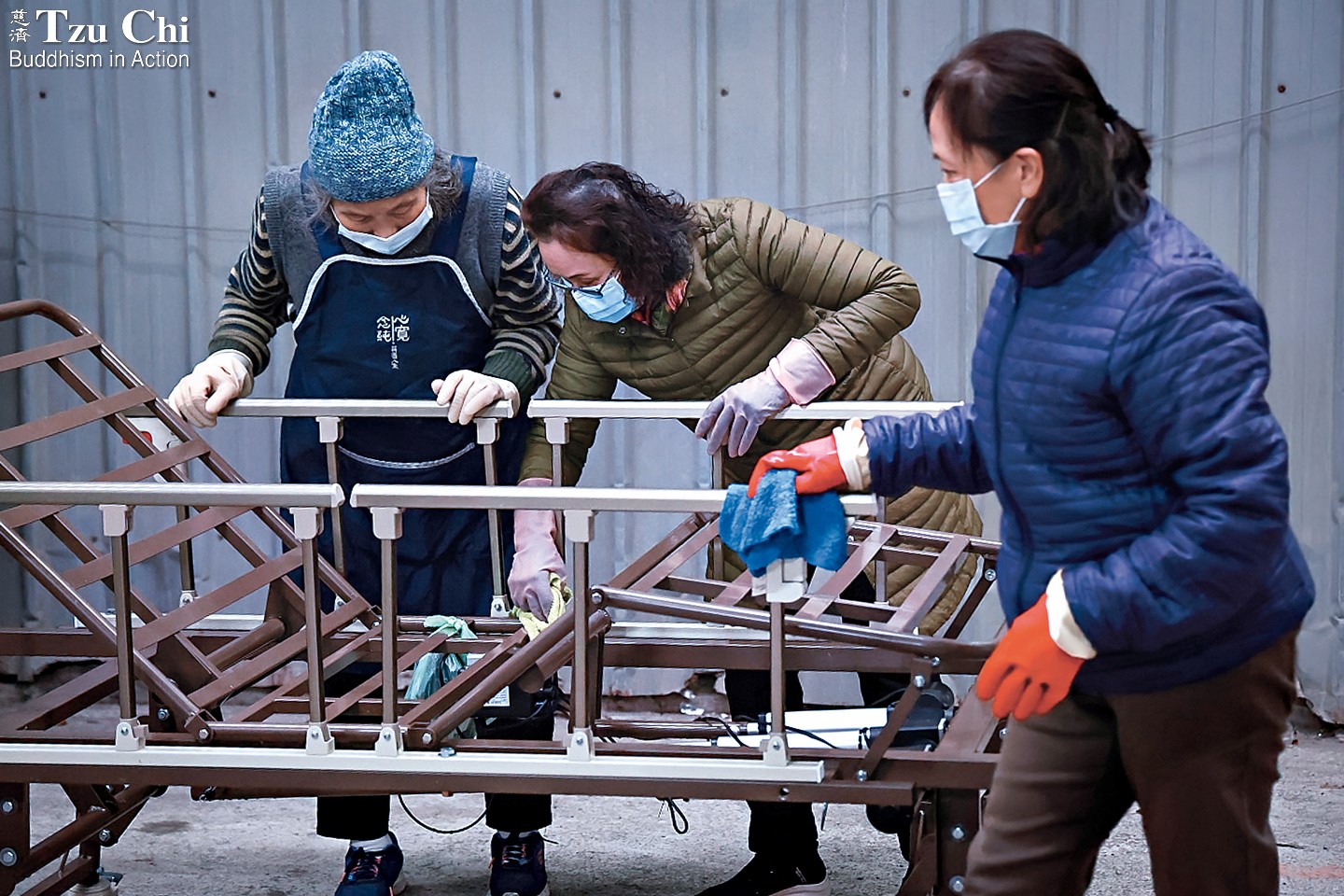
After the transport team retrieves assistive devices, they are passed to the cleaning and disinfection team for processing. Some require repairs or part replacements before being stored for future use.
Their smiles say it all
That day, as volunteers in the white truck made their way to deliver assistive equipment, they reminisced about a visit to a home on Ankang Road. As soon as they entered, they were greeted by a strong odor. The recipient was a bedridden man living alone, cared for by his former wife. Even though they had divorced, she continued to visit regularly and ensured he attended his medical appointments. She also cared for their daughter, who had an intellectual disability. The former wife did all this in addition to managing her own job.
The home was cluttered. The former wife cautioned the volunteers to be careful, as her ex-husband sometimes exhibited violent behavior. She politely asked them to leave the bed in the living room rather than move it into his room. Volunteer Wu asked, “The bed is heavy—how will you move it?” To save her the trouble, the volunteers cleared space and moved the bed inside. While doing so, they expressed their admiration for her resilience and sense of responsibility.
As the volunteers recalled the divorced couple, they arrived at one of their first stops. “This place looks so familiar,” a volunteer remarked. A fellow volunteer responded, “This is the very home we were just talking about!” As it turned out, they were returning to the bedridden man’s home to retrieve the assistive equipment. He had passed away, and his residence had been cleared out, leaving only a dim light and the equipment awaiting removal.
In the dimly lit space, the volunteers quietly dismantled the hospital bed. They were comforted by the thought that they had helped provide the husband with a comfortable bed in his final days. It reminded them of life’s impermanence and the importance of cherishing every chance to give.
The team made another stop on Donghu Road to deliver an air mattress to Ms. Chen’s elderly mother-in-law. The volunteers arrived just in time, delivering the mattress before her discharge from the hospital. They patiently explained how to use it. Grateful, Ms. Chen insisted on accompanying them downstairs to see them off, thanking them wholeheartedly.
A similarly heartwarming moment unfolded at their stop on Xinming Road, where Ms. Lin had requested a hospital bed for her 95-year-old mother. The volunteers cheerfully greeted the nonagenarian, who, despite her age, had sharp hearing and a quick mind, easily responding to small talk. Her good condition reflected the attentive care of her family, warming the volunteers’ hearts. Her radiant smile filled the volunteers with the deep joy of giving.
Vehicles carrying blessings
Seventy-year-old volunteer Zhan Fei-xiong (詹飛雄) repeatedly pounded his back, trying to ease the discomfort as he carried assistive devices during this trip. He had strained it on a previous delivery, and the injury still hadn’t healed. Even so, he showed up for duty. “It’s no big deal—I can still manage!” he said. Concerned, his fellow volunteers urged him to stay by the truck and leave the heavy lifting to them, but he insisted on joining them.
Working alongside him that day was volunteer Zhang Yi-ming (張逸銘). After the COVID-19 pandemic, Zhang left his career in China and returned to Taiwan for good, dedicating himself fully to volunteer work. Now a regular in the assistive device program, he serves on the transport team for the Neihu outlet.
Despite their varied professional backgrounds, once these volunteers put on their Tzu Chi uniforms, they become a united team, serving without complaint. They acknowledged the physical demands of the work but affirmed their commitment: “It’s exhausting, but we’ll keep going!” Each delivery provides not just practical assistance but heartfelt blessings as well. Volunteer Wu explained that some recipients struggle financially and can’t afford essential equipment. “Seeing their smiles when they receive our devices makes all our efforts worthwhile,” he said. “We can’t solve all their problems, but we can at least ease the burden of caring for their loved ones.”
